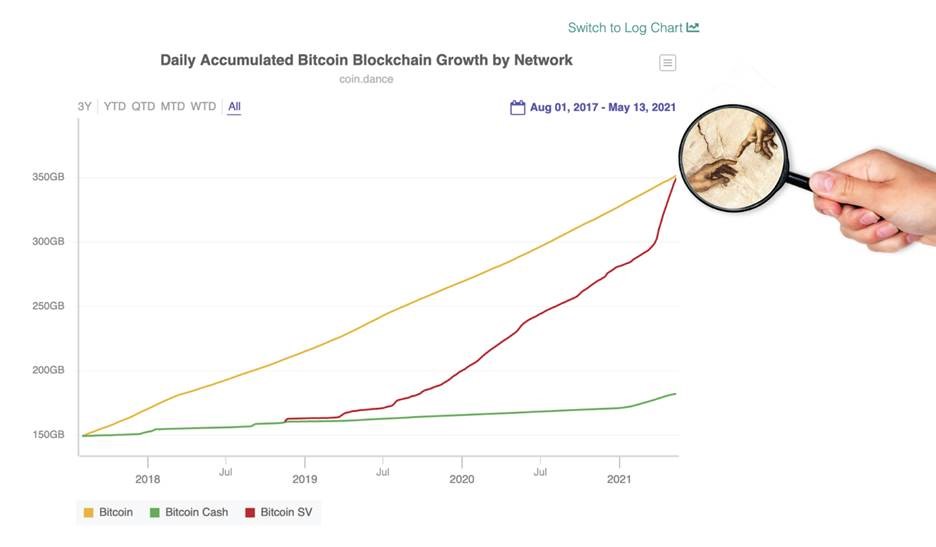The blockchain is a database which keeps every bit of data that users transact. In BTC, the maximum amount of data that can be written per 10-minute block is about one megabyte, or roughly six megabytes per hour. In BSV, there is no protocol limit, and no known practical limit. While BSV has been capable of bigger blocks than BTC, the average block size in BSV has generally been less than one megabyte per block since 2018 when BSV was liberated (against the will of most BSV’ers) from BCH.
Since the splits of the Bitcoin Civil War, the “Core” chain has grown very consistently. BCH and then BSV have generally had smaller blocks and fewer transactions per block than BTC—inciting jeers from the small blockers about how BSV’s mission was nothing but a harebrained solution to solve a perceived demand problem that did not really exist.
If you build it, they will come
The Bitcoin SV average block size has continued to slowly increase due to increased use of BSV’s consumer and business applications, which has allowed the total blockchain size to take back share against BTC. We should expect the total size of BSV’s blockchain not only to increase in size over time, but we should also expect the rate of its increase to accelerate as adoption comes to BSV. Since the ancestor limit has now been raised to allow chains of 10,000 child transactions to an unconfirmed parent, increasingly complex applications will begin to settle onto the blockchain, vindicating the battle cries of the big blockers since at least 2015.
So what is flippening?
BSV will have a larger total blockchain size than BTC for the first time since the original split of Bitcoin. Practically, this means that the cost and time to sync and store the data for new nodes will cost more, which is not something that small blockers will understand the value of. BTC proponents want to keep the total size of BTC as small as possible so average people can run full copies of the blockchain. But big blockers believe that the cumulative data on the ledger is itself the valuable commodity that the proof of work secures, and so profit-seeking nodes should desire more data that can be used in commerce from the blockchain.
The increase in the size of the blockchain will likely push smaller node operators off of the BSV network due to inability to compete with larger miners. Small blockers will say this is a bad thing, but this was part of the fundamental design of bitcoin, and it was what Satoshi advocated for.
The current system where every user is a network node is not the intended configuration for large scale. That would be like every Usenet user runs their own NNTP server. The design supports letting users just be users. The more burden it is to run a node, the fewer nodes there will be. Those few nodes will be big server farms. The rest will be client nodes that only do transactions and don’t generate. (Source: BitcoinTalk.org)
Eventually when we have client-only implementations, the block chain size won’t matter much. Until then, while all users still have to download the entire block chain to start, it’s nice if we can keep it down to a reasonable size.
With very high transaction volume, network nodes would consolidate and there would be more pooled mining and GPU farms, and users would run client-only. With dev work on optimising and parallelising, it can keep scaling up. (Source: Satoshi Nakamoto email to Mike Hearn. Wed, Dec 29, 2010 at 10:42 PM)
At first, most users would run network nodes, but as the network grows beyond a certain point, it would be left more and more to specialists with server farms of specialized hardware. A server farm would only need to have one node on the network and the rest of the LAN connects with that one node. (Source: The Cryptography Mailing List. Sun, Nov 2, 2008 at 8:37 PM)
Why should we care?
Blockchain size is an indication of use, and we believe that the aggregate data of global commerce is the most valuable, digital commodity in the history of the world!
If there wasn’t real use of the BSV blockchain, its size would remain small. But every Salmon tokenized on SeafoodChain, Every NFTY Jig, every speed round on Haste, every Pepe meme on Twetch, every certified pharmaceutical drug, every governance document from Tuvalu and every tip from Zatoshi using HandCash Connect has brought us to a point where consistently higher use in the applications of the Bitcoin SV economy has allowed us to surpass BTC in total secured data on the blockchain!
And this is just the beginning.
Source: Read Full Article

